18 October, 2017

In the second of three blogs on holding workshops with school pupils on the issues of migration, Umut Erel and Elizabeth Newcombe discuss an attempt to introduce pupils to the complexities of the language and the policy issues surrounding immigration, at a time of great global inequality and economic recession.
When holding a workshop for a school from Sussex at the Migration Museum Project’s Call Me By My Name exhibition in July 2017, it was striking to see school pupils becoming passionately engaged with issues of migration. The group of 15 pupils and their teachers arrived on one of the hottest days of the year, having already spent time wandering through London. Emily Miller, MMP’s head of learning and partnerships, started the workshop with an interactive game, using questions and movement in the space of the museum to break the ice and find out how everyone relates to migration. Some of the questions she asked were:
- Do you know someone who has migrated?
- Do you speak more than one language?
- Has anyone in your family migrated?
If our answer to these questions was ‘yes’, we had to take a step forward; if the answer was ‘no’, we were asked to take a step backwards. Soon most of us were concentrated in a tight circle in the middle of the room, and it had become clear that there was a lot of experience of migration, whether personal or indirect.

Drawing by Laura Sorvala.
The workshop then moved on to look at some of the key terms in the migration debate. A young refugee told of his experiences of migration, finding his way around life in the UK and how he now works in arts and education organisations in which he initiates dialogues on the experiences of refugees and migrants. All of us were stunned to hear of the difficulties he had overcome on his journey to the UK in the early 2000s. Some of the pupils shared their personal experiences of the country he came from and the countries he had passed through, which gave the encounter added poignancy.
After this informative and emotionally charged part of the workshop, we changed gears slightly and introduced a more academic take on the issues. Starting with an interactive exercise on global inequalities of income, we began to question the term migrant, pointing out that, when we use the terms ‘migrant’ and ‘refugee’, this does not refer to a legal figure or a dataset, but to a political figure. We discussed how British people living abroad almost always think of themselves as ‘expats’ not ‘migrants’, while Black Asian and Minority Ethnic (BAME) people who were born and have lived all their lives in the UK are often called ‘second generation migrants’. So, the decision about who counts as a migrant is often framed by assumptions about race, class and nationality.
When discussing migration, we often hear about the need to protect the welfare state from outsiders, but how can we understand the welfare state against the backdrop of global inequalities? We are living at a time of the highest level of global inequality in human history, when the wealth of 67 people is the same as the combined total of the world’s 3.5 billion poorest people, and the poorest 50 per cent of the world have 6.6 per cent of total global income. There are issues with the methodology of these estimates, but it cannot be denied that the world has changed from the 19th century. Today, for most people in the world, what is key to your life chances is the country you live in. The fear for those living in wealthier states is that there are a lot of people who are hard up in the world and that, if you don’t have much, you need to hold on to it.
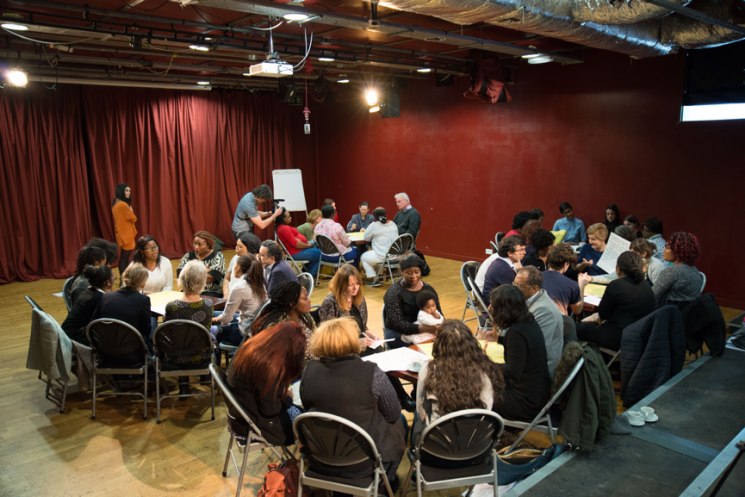
Photo of the PASAR project’s ‘From Margins to Centre Stage’ workshop, February 2017 © Marcia Chandra.
Migrant families’ exclusion from the welfare state was a topic in another research project – Participation Arts and Social Action in Research (PASAR) – we are currently running with our colleagues Erene Kaptani (Open University), Maggie O’Neill (University of York) and Tracey Reynolds (University of Greenwich). The PASAR project conducted participatory research with migrant mothers affected by the policy No Recourse to Public Funding (NRPF), which means migrants who are subject to immigration control are not allowed to access benefits, tax credits or housing assistance. This policy affects both migrants who have the right to remain in the UK and those who are undocumented. The policy pushes these migrant families – many of whom include young children, who are among the most vulnerable people – to the margins of society through poverty and racism. In a workshop with policy makers, practitioners and activists, we worked with a group of migrant mothers affected by NRPF to enable their collective voice to be heard. To do so, we showed a short theatre piece developed through the research.
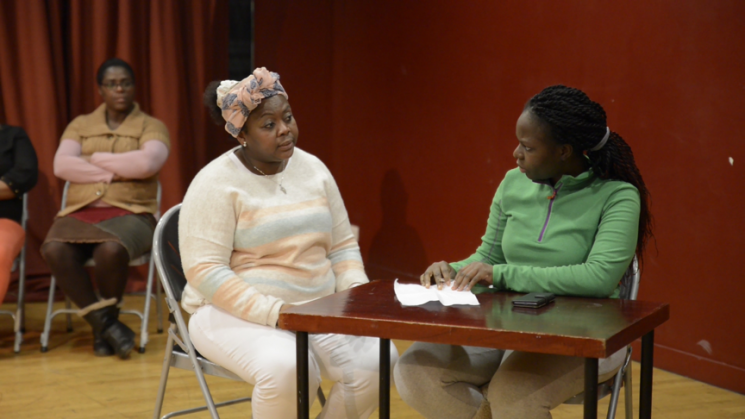
Photo from PASAR project theatre scene © Marcia Chandra.
At the schools’ workshop, we watched a short scene from this theatre piece about Elaine’s experience. Elaine had been working for many years for a large supermarket. She needed to take time off every two weeks to sign into the Immigration Reporting Centre, a requirement of the Home Office. Her manager used his knowledge of her vulnerability to bully her and change her onto an unfavourable night shift, even though she had just had a baby. Her union representative’s response was that as an immigrant she should be glad to have a job. She also experienced stigmatisation by fellow workers, who saw her as an ‘illegal’ immigrant. Eventually, she lost her job – unable to pay rent, Elaine, her husband and six-year-old son have for four years now been living in the houses of friends and acquaintances, surviving on their monetary support.
This example shows how racism, anti-immigration policies and austerity intersect. An increasingly hostile climate to immigration has made it more difficult for migrants to find formal and informal employment. As a consequence of increasingly stringent migration regulations, particularly since 2012, more and more migrant families are subject to migration control, prevented from accessing public funds and rendered unable to economically support themselves (Price and Spencer, 2015). In a situation of crisis – through the loss of jobs or accommodation, relationship breakdown or health problems – they cannot draw on the relative safety net of the welfare state to help them overcome these points of crisis and are pushed more and more to the margins of society.
Having watched a short video clip of these theatre scenes with the school pupils, we had an interesting discussion about some of the issues raised by Elaine’s story:
- How can labels such as ‘illegal migrant’ be misleading and stigmatising?
- Why are some people, and not others, allowed to draw on welfare services?
- Should contributions through work be the criterion for deciding whether migrants can participate in the welfare state?
- Should there be other criteria for inclusion into welfare, based on colonial and postcolonial ties?
- Should there be criteria based on shared humanity?
It is hard to summarise the workshop, as it was rich and varied, but it seems to me that this variety of modes of engagement (personal testimony, interactive activities, and audio-visual material and information) has been fruitful in raising many questions, showing the complexity of issues of migration and welfare, and linking conceptual discussions to personal experiences of migration, which are often far richer than those portrayed in public debate. While teachers challenged us as academics to present information in accessible ways, especially for pupils who are still learning English, their feedback was heartening: ‘Our students learnt a lot from the experience both about migration at the human level but also the bigger picture of why these issues are so pressing for the UK at the present time. A great day well spent!’
Reference
Price, Jonathan, and Spencer, Sarah (2015) Safeguarding Children from Destitution: Local Authority Responses to Families with ‘No Recourse to Public Funding’. Oxford: COMPAS.
Umut Erel is Senior Lecturer in Sociology at the Open University. She is Principal Investigator of PASAR, an ESRC-funded research project investigating the opportunities and challenges of using participatory theatre and walking methods for social research.
Emma Newcombe is the Head of External Relations for COMPAS and the Global Exchange on Migration and Diversity. She oversees all COMPAS’s communications work, and also supports the development of the ESRC Urban Transformations project. She has an MA in Migration Studies from the University of Sussex and a BSc in Social Policy from the University of Bristol.
6 October, 2016
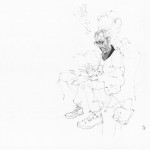
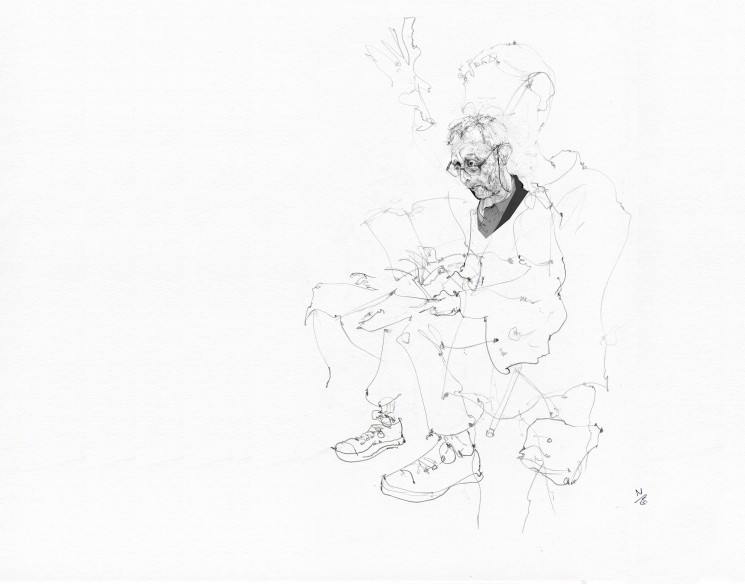
Michael Rosen, compering the ‘Poetry of Migration’ event at Londonewcastle Project Space earlier this year; drawing by Nick Ellwood.
One of the first events we held in the course of our three-week residency at Londonewcastle this summer (where more than 4,000 people visited our exhibition Call Me By My Name: Stories from Calais and Beyond) was the ‘Poetry of Migration’ on Tuesday 6 June. Michael Rosen (distinguished poet, writer, entertainer – and distinguished friend of the Migration Museum Project) compered the event, at which Ruth Padel and Jackie Kay were fellow guest speakers.
When we’d advertised the event, we had also asked people to let us know if they would like to present their own poems, so the evening was less about studious, respectful listening to the panel poets – though it was that, too – and more about participation. People presented their poems from the floor – Sophie Herxheimer, PJ Samuels, Antoine Cassar, Nadia Faydh and Elizabeth-Jane Burnett among them – and the audience expressed the full range of response you might have expected from an evening of poetry based around the theme of migration: tears, laughter, some anger, some despair. As a curtain-raiser for the exhibition itself, it was perfectly judged.
Nick Ellwood, the artist behind the panel drawings of Jungle residents in the middle room, sat in the audience and drew portraits of some of the performers. We’ve reproduced his drawings in this blog, together with some of the poems read out by the people he was drawing. It’s a rich combination: one of the artists we were privileged to work with for the exhibition producing beautiful sketch drawings of some of the incredibly talented writers we were thrilled to have perform at the event. We hope you enjoy this memento of the evening.
Ruth Padel
Purple Ink
She has waited three years for this. Too ashamed
to even half-tell the young woman in spectacles
tapping a purple biro on a desk
exactly what the soldiers did to her, each versatile
in his turn, she gets wrong Date your mother was born
and sees a stamp the colour of desert night descend on her file.
The Prayer Labyrinth
She went looking for her daughter. How many
visit Hades and live? Your only hope
is the long labyrinth of Visa Application
interviews with a volunteer from a charity
you’re not allowed to meet. You’ve been caught:
by a knock on the door at dawn
or hiding in a truck of toilet tissue
or just getting stuck in a turn-stile.
You’re on Dead Island: the Detention Centre.
The Russian refugees who leaped from the fifteenth floor
of a Glasgow tower block to the Red Road
Springburn – Serge, Tatiana and their son,
who when the Immigration officers
were at the door, tied themselves together
before they jumped – knew what was coming.
Anyway you’re here. Evidence of cigarette
burns all over your body has been dismissed
by the latest technology. You’re dragged
from your room, denied medication
or a voice. You can’t see your children,
they’re behind bars somewhere else.
You go on hunger strike. You’re locked
in a corridor for three days without water
then handcuffed through the biopsy
on your right breast. You’ve no choice
but to pray; and to walk the never-ending path
of meditation on not yet. Your nightmare
was home-grown; you’re seeking sanctuary.
They say you don’t belong. They give you
a broken finger, a punctured lung.
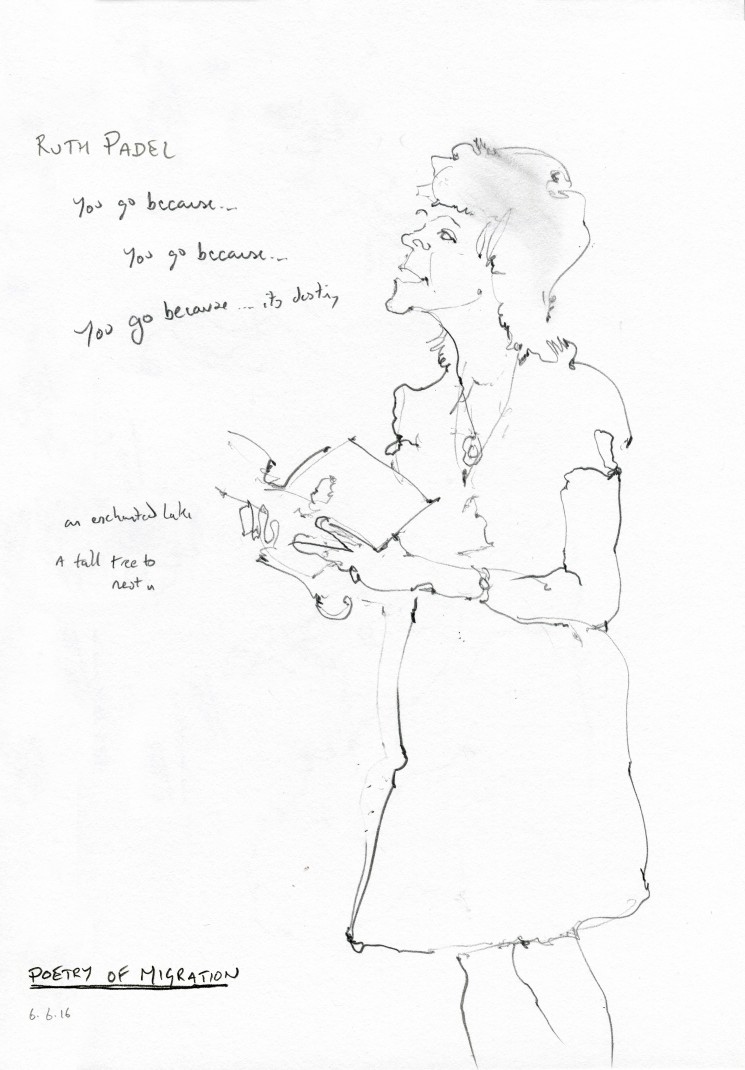
Ruth Padel, reading her poem ‘Time to Fly’; drawing by Nick Ellwood.
Time to Fly
You go because you heard a cuckoo call. You go because
you’ve met someone, you made a vow, there are no more
grasshoppers. You go because the cold is coming, spring
is coming, soldiers are coming: plague, flood, an ice age,
a new religion, a new idea. You go because the world rotates,
because the world is changing and you’ve lost the key.
You go because you have the kingdom of heaven in your heart.
And the kingdom of hell has taken over someone else’s heart.
You go because you have magnetite in your brain, thorax, tips
of your teeth. Because there’s food over the hill
and there’ll be gold, or more likely bauxite,
inside the hill. You go because your mother is dying
and only you can bring her the apples of the Hesperides.
You go because you need work.
You go because astrologers say so. Because the sea
is calling and your best friend bought a motorbike
in America last year. You go because the streets are paved
with gold and your father went when he was your age.
You go because you have seventeen children and the Lord will provide;
because your sixteen brothers have parcelled up the land
and there’s none left for you. You go because the waters are rising,
an ice sheet is melting, the rivers are dry
there are no more fish in the sea. You go because God
has given you a sign – you had a dream – the potatoes are blighted.
Because it is too hot, too cold, you are on a quest for knowledge
and knowledge is always beyond. You go because it’s destiny,
because Pharoah won’t let you light candles at sundown on Friday.
Because you’re looking for
an enchanted lake, the meaning of life, a tall tree to nest in.
You go because travel is holy, because your body
is wired to go, you’d have a quite different body and different brain
if you were the sort of bird that stayed. You go
because you can’t pay the rent: creditors lie in wait for your children
after school. You go because Pharoah has hogged the oil,
electricity and paraffin so all you have on your table
are candles, when you can get them.
You go because there’s nothing left to hope for;
because there’s everything to hope for and all life is risk.
You go because someone put the evil eye on you
and barometric pressure is dropping. You go because
you can’t cope with your gift – other people can’t cope with your gift –
you have no gift and the barbarians are after you.
You go because the barbarians are gone, Herod
has turned off the internet and mobile phones, the modem
is useless and the eagles are coming. You go because the eagles
have died off with the vultures and the ancestors are angry
there’s no one to clean the bones. You go in peace, you go in war.
Someone has offered you a job. You go because your dog
is going too. Because the Grand Vizier sent paramilitaries to your house last night
you have to go quick and leave the dog behind.
You go because you’ve eaten the dog and that’s it, there’s nothing else.
You go because you’ve given up and might as well. Because your love
is dead – because she laughed at you; because she’s coming with you,
it will be a big adventure and you’ll live happily ever after.
You go in hope, in faith, in haste, high spirits, deep sorrow, deep
snow, deep shit and without question.
You pause halfway to stoke up on Omega 3 and horseshoe crabs.
You go for phosphorus, myrtle-berries, salt. You go for oil
and pepper. It was your father’s dying wish.
You go from pole to pole, you go because you can,
you have no feet, you sleep and mate on the wing.
Because you need a place to shed your skin
in safety. You go with a thousand questions but you are growing up,
growing old, moving on. Say goodbye to the might-have-beens –
you can’t step into the same river twice.
You go because hope, need and escape
are names for the same god. You go because life
is sweet, life is cheap, life is flux
and you can’t take it with you. You go because you’re alive,
because you’re dying, maybe dead already. You go because you must.
© Ruth Padel from The Mara Crossing, Chatto and Windus, 2012
Sophie Herxheimer
London
Not zo mainy Dais zinz ve arrivink.
Zis grey iss like Bearlin, zis same grey Day
ve hef. Zis norzern Vezzer, oont ze demp Street.
A biet off Rain voant hurt, vill help ze Treez
on zis Hempstet Heese vee see in Fekt.
Vy shootd I mind zat?
I try viz ze Busses, Herr Kondooktor eskink
me … for vot? I don’t eckzectly remempber;
Fess plees? To him, my Penny I hent ofa –
He notdz viz a keint Smile – Fanks Luv!
He sez. Oh! I em his Luff – turns Hentell
on Machine, out kurls a Tikett.
Zis is ven I know zat here to settle iss OK. Zis
City vill be Home, verr eefen on ze Buss is Luff.
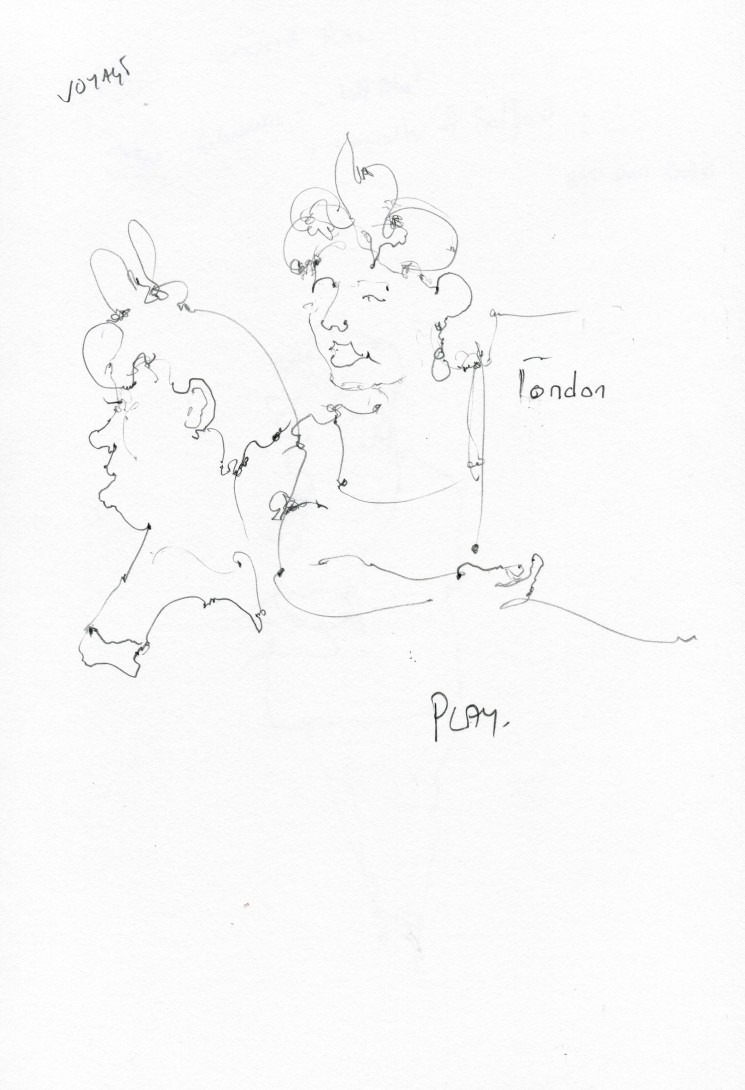
Sophie Herxheimer, drawn in full flow when reading ‘London’; drawing by Nick Ellwood.
Vosch by Hendt, Lern by Hart!
Ze yunkest off my grayt grayt
Grent-Childtrenn is lynink up
her Dollse oont Behrs for Klarse.
Ven zay slump in rekggitt
Exhorstschon, she arraintches zem
to lean on ze Kupboart. Zit up ztrate!
She Kommarnts. If Enny Vun
off you nose ze Aanser, don’t
schout out; poot up your Hendt!
Ze Svetter zat zis Teacher
vairs, looks ottley familiar.
Ze Vun Aunt Frieda sent from Vienna
for my Girl ven she voz small.
I see ze Vool still hess some Bountz.
Oont amazinkly, no Moss Holse!
Funny Frieda alvays sett she dittn’t
leik to knit: I heffnt ze Payschunz,
she leidt. Zis Svetter hess en intrikett
Pettern off blue Skvairs, raist in a Ridch
ofa nice veit Stokkink Stitch –
I marfellt et it zen, ven it arrifte, springink
like a Lemm from stiff brown Paper.
Vizzin Veeks of zat, Frieda, leik zo Menny,
voz seeztd, imprissont, murdtert.
Now zis endurink Laybor off hurze
iss vorn ess a Keint off Uniform:
kommarntink All who are born, or eefen
stufft: Make Sinks. Make Sinks up! Play!
© Sophie Herxheimer
‘London’ first appeared as no.22 in a series of concrete poetry broadsides from Brazil, called POW, subsequently appearing in Jewish Quarterly and Long Poem Magazine, and was also made into a film.
‘Vosch by Hendt, Learn by Hart’ has just been published in the Vanguard Anthology.
Nadia Faydh
Things I miss
When I wake up to the cloudy sky
Of London,
I feel overwhelmed:
A fit of yearning.
It is not that I want to go back,
but simply miss the way it was:
The sunny mornings,
The fresh smell of Cardamom
My mother used to make with tea
Or the smell of fresh bread,
When my father is back from the bakery …
Maybe I miss those Fridays,
When all the sisters gather around;
Voices of playing kids
Filling the air with delicious noise,
“the house can’t take us all,”
I would say,
My mother would stop me…
She likes it when we’re all there.
Maybe I miss dad’s big smile:
when his granddaughters
Greet him with a kiss.
I miss watching all the girls
Working in the kitchen,
Or Sit to the table laughing loud …
Dad would come in, take a picture,
To remember those moments I miss!
© Nadia Faydh
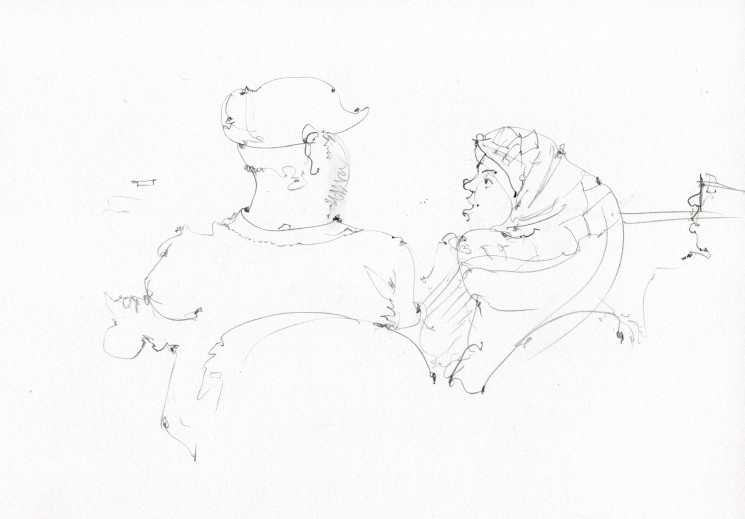
Guest readers at the event – Antoine Cassar on the left, Nadia Faydh on the right; drawing by Nick Ellwood.
Antoine Cassar
8 ħajki bla fruntieri
8 no-border haiku
1
L-ajruport. Tifel
ċkejken jaqbeż iċ-checkpoint.
Ma jafx b’fruntieri.
The airport. Boy leaps
over the customs checkpoint.
He knows no borders.
2
Tfajjel Sirjan
fuq il-kanvas tat-tinda
ipinġi d-djar.
A Syrian boy
paints houses on the canvas
of his tent.
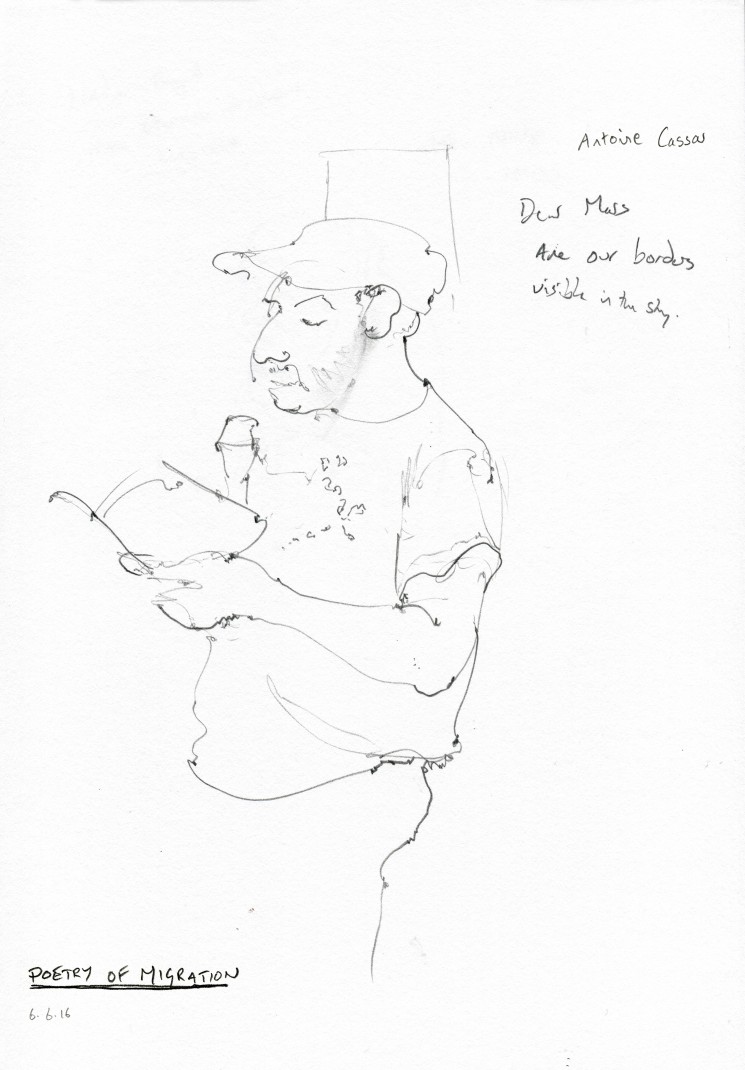
Antoine Cassar, drawn by Nick Ellwood.
3
L-ebda bandiera
ma jistħoqqilha qima
daqs l-id li tħitha.
No flag, large or small,
deserves greater esteem than
the hand that sews it.
4
Il-bnedmin jaqsmu
l-fruntieri? Anzi. Il-fruntieri
jaqsmu ’l-bnedmin.
People cross borders.
It’s been that way ever since
borders crossed people.
5
Għeżież nies ta’ Mars:
jidhru l-fruntieri tagħna
fis-sema tagħkom?
Dear people of Mars:
are our borders visible
in your evening sky?
6
Ewropa! Intix
tisma’ l-imħabba ssejjaħ
minn qiegħ il-baħar?
Europe! Can you not
hear love calling out from the
bottom of the sea?
7
Għidli ftit, baħar,
kif għadek tmelles l-art
li tridek qabar?
Would you tell me, sea,
why you still caress the land
that has made you a grave?
8
Id-dinja tonda?
Saqsi lir-riħ, u ‘l-fens
mal-art ta’ Calais …
Is the world not round?
Ask the wind. Ask the Calais
fence, blown to the ground d…
Elizabeth-Jane Burnett
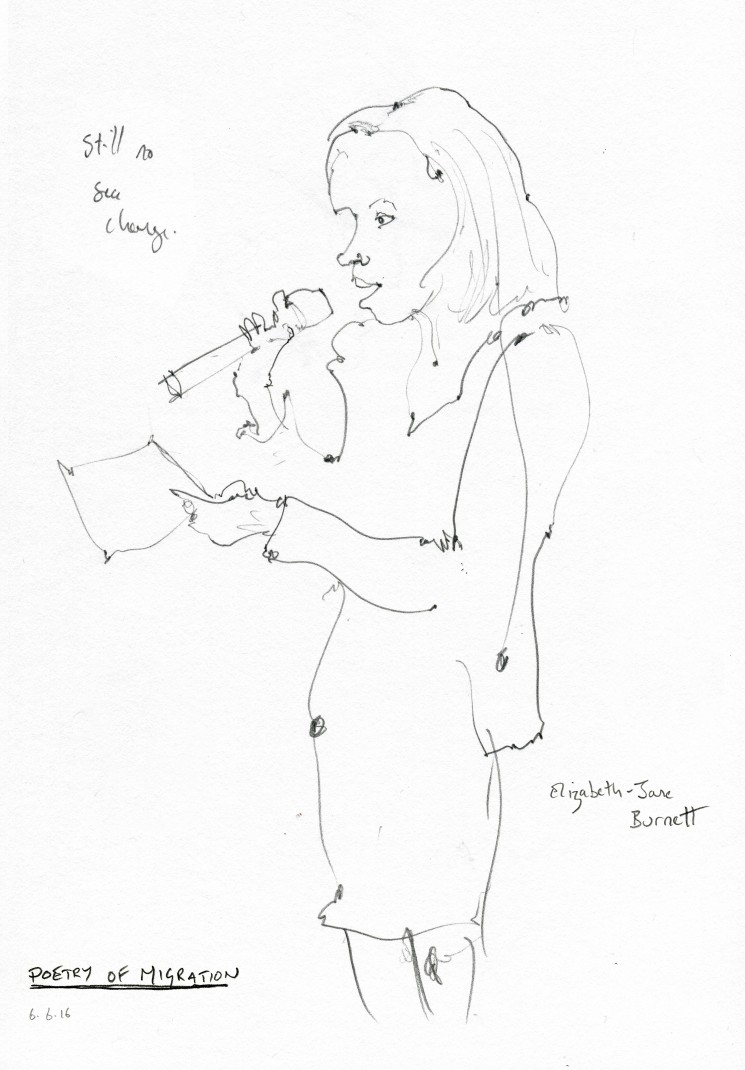
Elizabeth-Jane Burnett, drawn by Nick Ellwood.
Talking to Ariel about Our Place in the Canon and Other Sea-Nymph Stuff
What did you notice, apart from the cold?
“It was –4 and three inches of snow.”1
What words will you choose to speak for you, whose
archive to bootleg to send over To:
recipients of black body unable to process except as appropriation or lost thing searching for warm amputations please
find history attached
in a speech of the eyes which do not lie or sound
as a Dali sequence of cuts let us process each other
through peel of vitreous fluid let us touch another fathom falls
as we see what we are made of: these yellow sands, these light bones
pulse as snowdrops through the dead days of autopsy:
still no sea-change.
1 Sam King, aged 81, a migrant from Priestmans River, Jamaica, to Bexley, Kent.
PJ Samuels
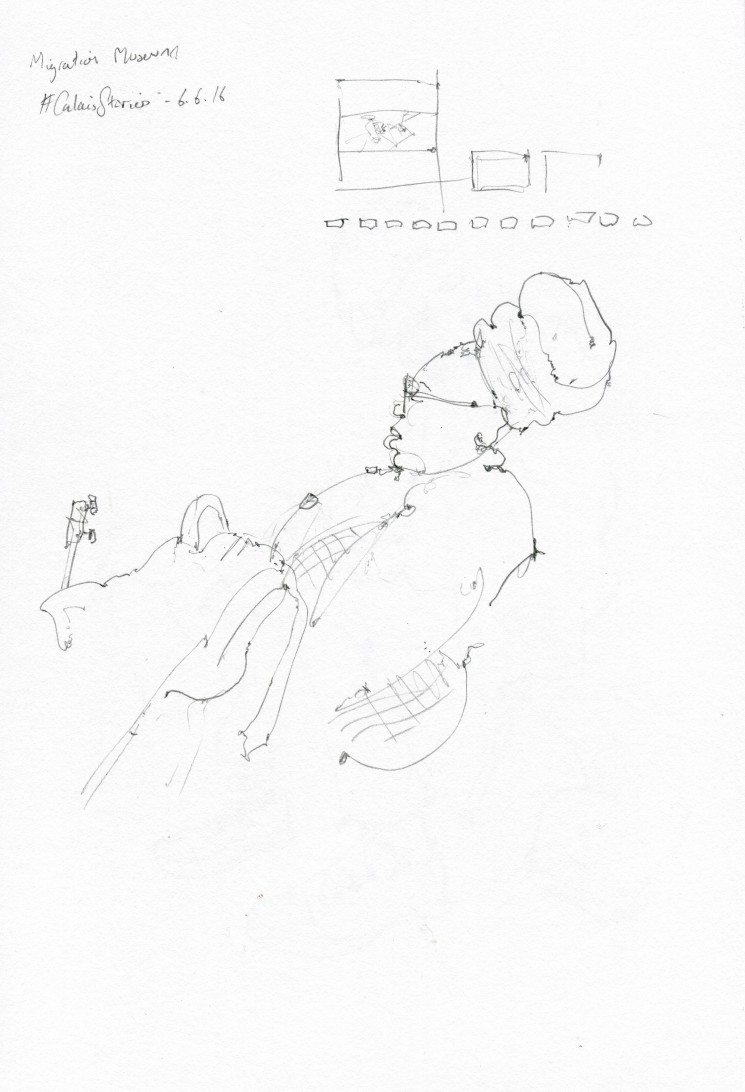
PJ Samuels, drawn by Nick Ellwood.
Whittle
I didn’t come here under a lorry
with bin liners over my head
so the carbon dioxide readers
cannot sense my breath
I didn’t sail here on a rubber dingy
and watch my brothers and sisters
become food for sea creatures
I didn’t cross a continent over land
needing to buy a new passport
and acquire a new name
at each border crossing
I am from Jamaica
Called the pearl of the Caribbean Sea
It is beautifully idyllic
My land is not torn apart by war
Just chained by terminal culture norms
I was on last rites
I bought a ticket, flew British Airways
Was served vodka and lemon en flight
Here I am
Tell me your story you said
Here is the altar, worship I brought me
And you made of me a sacrifice
Systematically stripped me
Peeled back my flesh
and pulverized my bones
Whittled me down to who I fuck
To how I fuck
To when I learned what fuck was
To how many times did you fuck her
what exactly did you do
Torn apart by need
whittled
Whittle
To cut small bits or pare shavings from
To reduce or eliminate gradually
To cut or shape wood with a knife.
Not a word much used
to describe a human being
But in your eyes, am I human?
You taught me inconsequential.
I brought the best of me
and had to learn that what you really wanted
was no part of me
With your callused carpenter’s hands
you whittled me down
to what you find consumable
there, you said,
I have made you beautiful
See how good I am to you?
here I am
your Pygmalion
your Aphrodite’s blessing
your social experiment
your triumph
Don’t I wear your guilty well?
Always with the dichotomy
of gratitude and grief
Wracked by survivors’ guilt
I sorrow for fragments of me left
in a land across waters
But it’s the pieces you took that remade me warrior
A constant itch under skin
I sit on the fence
vacillating between thank you and fuck you
And knowing even so
I am one of the lucky ones
Michael Rosen
Madame le Pen
Mme Le Pen,
la raison pourquoi
on a donné une étoile jaune
à l’oncle et à la tante de mon père
la raison pourquoi
on a demand qu’ils devaient attacher
une affiche disante ‘Enterprise juive’
à leur étal de marché
la raison pourquoi
ils ont fuit leur asile
dans la rue Mellaise à Niort
la raison pourquoi
ils se sont réfugiés à Nice
la raison pourquoi
on les a arrêtés et on les a transportés
à Paris, à Drancy, à Auschwitz et à leurs morts
est parce que
les officiers de Vichy
ont fait un ‘Fishier juif’ des juifs étrangers
et l’a donné aux Nazis au moment exacte
que la Résistance a dit bienvenu aux juifs
bienvenu aux étrangers
et c’est ça, la raison pourquoi
je vous dis ces choses
Mme Le Pen.
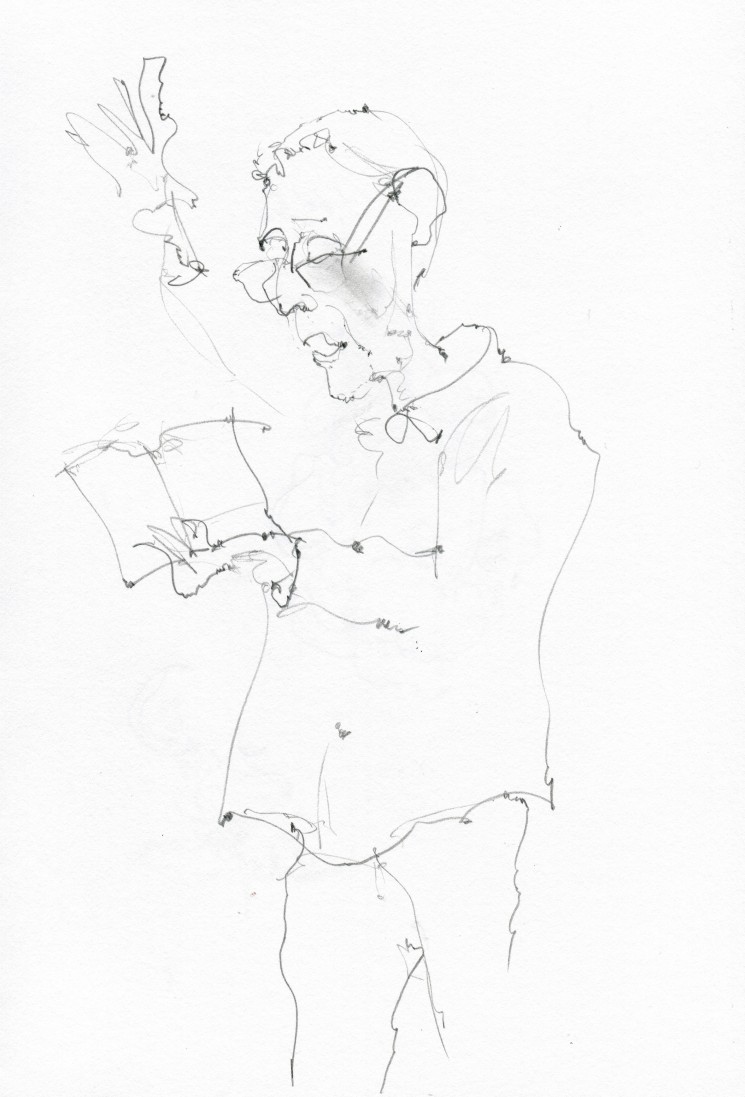
Michael Rosen, reciting his poem ‘To Madame le Pen�’; drawing by Nick Ellwood.
Mme Le Pen,
the reason why
they gave a yellow star
to my father’s uncle and aunt
the reason why
they told them they had to fix a sign
saying ‘Jewish Business’ on their market stall
the reason why
they fled from their refuge in the rue Mellaise
in Niort
the reason why
they took refuge in Nice
the reason why
they were arrested and transported
to Paris, to Drancy, to Auschwitz and to their death
is because the officials of Vichy
made a ‘Jewish File’ of foreign Jews
and gave it to the Nazis
at the exact moment
that the Resistance was welcoming
Jews and was welcoming foreigners
and that’s the reason why
I am telling you these things
Mme Le Pen.
Mother Father Cable Street
You Connie Ruby Isakofsky
From Globe Road in Bethnal Green
You Harold Rosen
From Nelson street, Whitechapel
You Connie with your mother and father
From Romania and Poland
You Harold with your family from Poland
You Connie
You Harold
your families working in the rag trade
Hats, caps, jackets and gowns
Hats, caps, jackets and gowns
You both saw Hitler on the Pathe News
You both saw Hitler Blaming the Jews
You both collected for Spain,
collecting for Spain
When Franco came
When round the tenements,
the whisper came
Mosley wants to march
Here, through the East End
So what should it be?
To Trafalgar Square to support Spain:
No pasaran?
Or to Gardiners Corner to support Whitechapel:
They shall not pass.
Round the tenements
The whisper came
Fight here in Whitechapel
The whisper came:
Winning here
We support
Spain there.
These are the streets where we live
These are the streets where we go to school
These are the streets where we work
They shall not pass.
You Connie
You Harold
Went to Gardiner’s Corner
You went to Cable Street
You piled chairs on the barricades
The mounted police charged you
A stranger took you indoors
To escape a beating
And thousands
Hundreds of thousands came here
Fighting Mosley
Supporting Spain
Thinking of Germany
And
Mosley did not pass.
You Connie
You Harold
Said, today the bombs on Guernica in Spain
Tomorrow the bombs on London here.
And you were bombed
the same planes, the same bombs
landing in the same streets
where you had said
they shall not pass
And the bodies
piled up across the world
Million after million after million after million
You Connie, your cousins in Poland
Taken to camps
Wiped out
You Harold, your uncles and aunts in France and Poland
Taken to camps
Wiped out.
But you Connie, my mother
You Harold, my father
You survived
You lived
We were born
We grew
You mother
You father
told us these things
I write these things
And today,
I tell you these things
We remember here together
Thanks to you
And we say:
They shall not pass.
© Michael Rosen
8 June, 2016
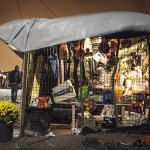
This guest blog is written by Rob Pinney, one of the photographers who submitted photos for our exhibition, Call Me By My Name: Stories from Calais and Beyond, which is at 28 Redchurch Road, London, until 22 June (details here). Rob’s book, The Jungle, is on sale at the exhibition and from his website (see below) with all profits going to charities working in Calais.
A complex relationship in a complex place
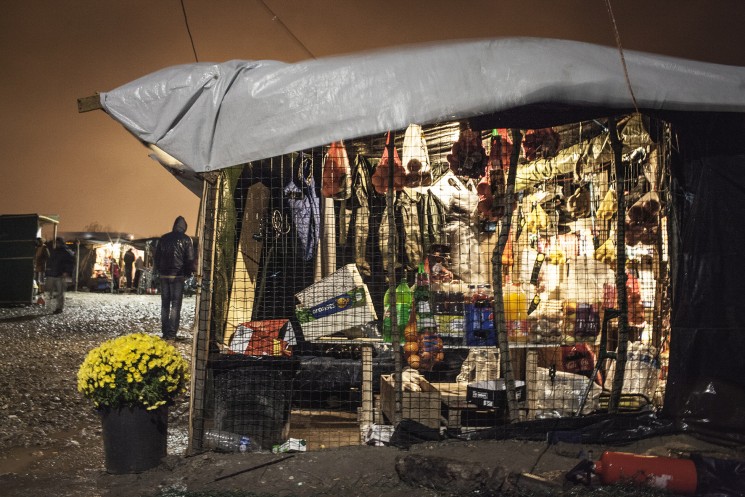
Grocery Store, November 2015. Shops like this provide, among other things, basic food staples and mobile phone credit top-ups, incredibly important for keeping in touch with family both at home and often at different stages of the refugee ‘trail’ through Europe. Many people in the ‘Jungle’ report having been victimised and attacked by both the police and ordinary citizens when outside the camp, and so feel unsafe walking into Calais to use local shops. This particular shop was destroyed in March 2016 as part of the eviction and demolition of the southern half of the camp. © Rob Pinney
As the main point of departure for sea and rail travel to Britain, the coastal town of Calais in northern France has become a ‘hotspot’ for asylum seekers hoping to build a new life in the United Kingdom.
‘The Jungle’ — the term used to refer to the shanty town settlements that have become synonymous with Calais — has no fixed location. But it is most commonly associated with a former landfill site not far from the ferry port that at its peak during the 2015 refugee crisis held a population of some 8,000 people.
The political discourse around the jungle and those temporarily seeking shelter there thrives on generalisations. Labelled a ‘swarm’ and a ‘bunch of migrants’ by British Prime Minister David Cameron, in the eyes of many the people here are not individuals but a collective mass — the object of a confused war of words: ‘refugees’, ‘asylum seekers’, ‘economic migrants’.
The reality is far more complicated. Many have fled war and political persecution. Others, notably from Afghanistan and Iran, left to avoid being made to fight for a cause they did not believe in. Many will show you photographs on their mobile phones of family already living in the United Kingdom, whom they hope to join. And some have spent years, occasionally decades, living and working in the UK, only to find themselves suddenly ejected. For them, the journey is not one of migration but a return home.
‘What is it like?’, often asked, is a simple question that defies an equally straightforward answer. Unlike the epic photographs of Zaatari in Jordan, whose orderly lines of identical shelters extend outwards on a vast scale, the Jungle follows no such logic. The Jungle is a city. Alongside countless tents and shelters, nestled into any and all available space with little regard to order, stand shops, cafes, restaurants, hairdressers. While different nationalities have generally grouped themselves together — as is common in any city — these lines are also frequently transgressed by a shared political precarity that unites its citizens. But above all, the Jungle is a city that is constantly changing. Some of these changes are internal and organic, but others have been the result of more profound changes in the political landscape in which the Jungle is deeply embedded, and yet over which it holds no control.
While cameras are a common sight, they are treated with great suspicion. Many people are wary of being photographed: some fear it may endanger their families should news of their escape reach home; others worry that evidence of their presence in France may be used against them should they eventually claim asylum in Britain; and others still feel ashamed of the situation they now find themselves in and do not want it immortalised in any resulting pictures.
It is not difficult to create photographs that evoke misery and suffering in the Jungle. And while such pictures might fit with what we think documentary photography ought to look like, such images usually take recourse to particular visual tropes and do little to deepen public understanding of a complex place at a time when greater understanding is so sorely needed. At the same time, it would be wrong to beautify what remains an utterly deplorable situation that exists not out of necessity but because of broken politics.
The photographs presented here are drawn from a much larger collection that spans four trips over six months. This selection is tempered by conversations I have had with some of those who live there about photography and the representation of the Jungle in the media. One friend from Darfur lamented the way in which many photographers came simply to ‘make their own business’. While I hope that the time I have spent volunteering on each of these trips is sufficient in his eyes to keep me out of this category, I also hope that the images here are seen as ones that are sensitive and respectful towards the issues so frequently voiced by the Jungle’s people. There are no portraits, nor any identifiable faces. In their place, I have tried to show traces of the many lives that are now collectively on hold. The impression left may be one of a desolate, depopulated landscape. But the reality couldn’t be further from that: beyond the edges of each frame is a vibrant and dynamic city in the making.
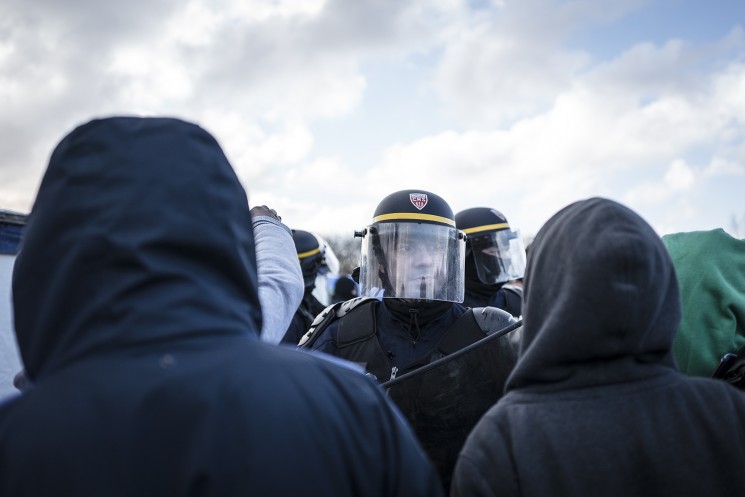
Police Lines, March 2016. Eritrean men watch through police lines as their shelters are destroyed. Following the partial eviction that took place in January 2016, the authorities announced a more significant intervention two months later: the southern half of the camp was to be evicted and demolished. They estimated that this area contained 800–1,000 people, but a census conducted by charities working in the camp suggested the figure was as high as 3,500. Many of those who lost their homes chose to leave the ‘Jungle’ and retrace their steps, often heading back to Germany, where asylum policy is thought to be more lenient. But many others moved into the little remaining space in the northern half of the camp, condensing those from different communities ever closer together. © Rob Pinney
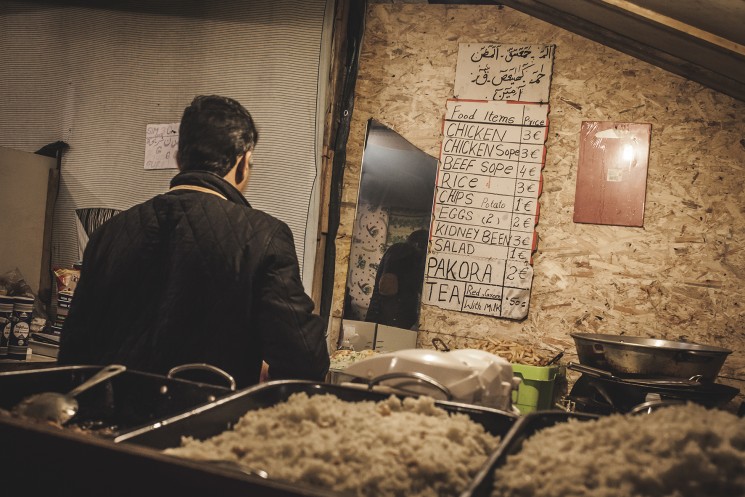
Mario’s, November 2015. Mario’s is one of a number of restaurants that used to line the mud road running through the southern half of the camp. Many of the owners were formerly child asylum seekers who had been granted leave to remain in the United Kingdom but who had to leave upon turning 18 years old. Many now have asylum in France and, in some cases, Italy, but continue to run their businesses in the ‘Jungle’. Mario, who owned the 3 Star Hotel, was given his name on account of his impressive moustache. The hotel was among the hundreds of makeshift restaurants, businesses and homes that were destroyed as part of the eviction and demolition of the southern half of the camp in March 2016. Since then, and as the number of newcomers has started to increase once more, many of the remaining restaurants have opened their doors to people hoping to avoid the bitter cold of a night spent in a tent. © Rob Pinney
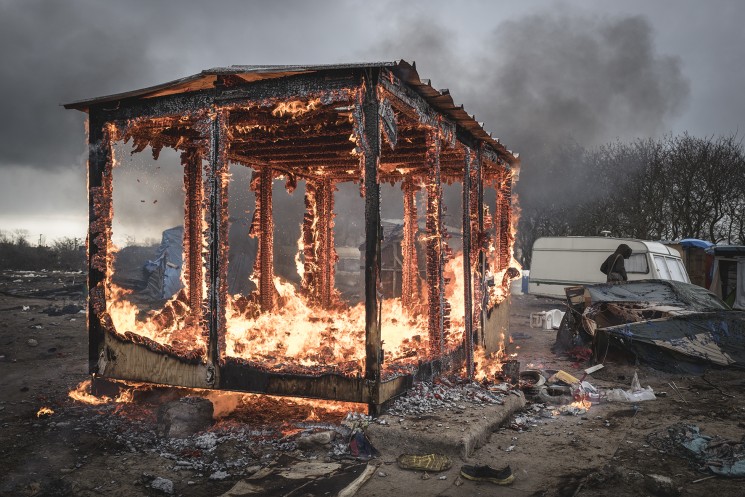
Burning Shelter, March 2016. As the eviction of the southern half of the ‘Jungle’ gathered pace, fires set by refugees and the use of tear gas by French riot police became commonplace. In the UK, the media have woven the persistence of fires into a narrative of destruction and lawlessness. But you might also see it this way: the decision to put a match to the walls of their shelters is arguably the only way refugees were able to exert at least a degree of agency over the inevitable destruction of their homes. © Rob Pinney
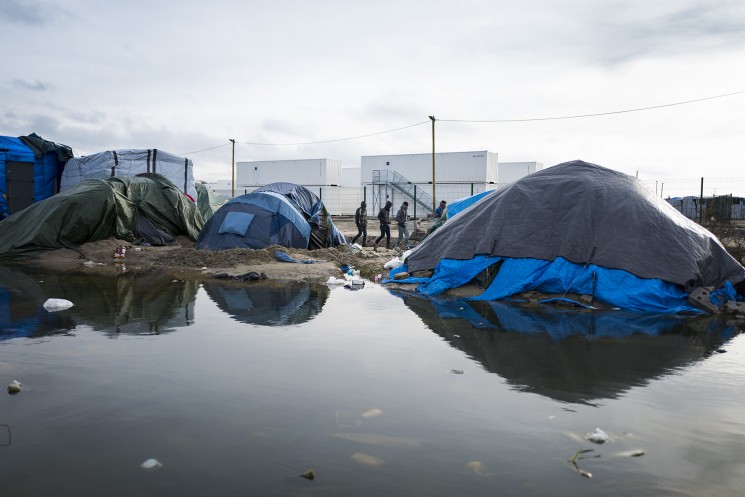
Shipping Container, January 2016. In January 2016, French authorities announced that they were going to clear a 100-metre ‘buffer zone’ between the edge of the camp and the adjacent motorway, which leads to the ferry port. At the time, charities working on the ground estimated that this would mean the displacement of more than 1,000 people. It was suggested that at least some of the displaced could move into these newly built converted shipping containers. Among residents of the ‘Jungle’, the reaction to the new containers – presented generally in the British media as a generous gesture – was decidedly mixed. Although they offered a warm and dry place to sleep for 1,500 people, the fear was that the registration information and biometric data that were gathered as the condition of a place (entry is granted by a handprint scanner) might be used against any refugee reaching Britain and making an eventual asylum claim under the Dublin Regulation. More generally, many also felt that by moving into the new containers they would isolate themselves from family, friends and the broader social environment of the camp. One resident described the containers as being ‘like a prison camp’. © Rob Pinney
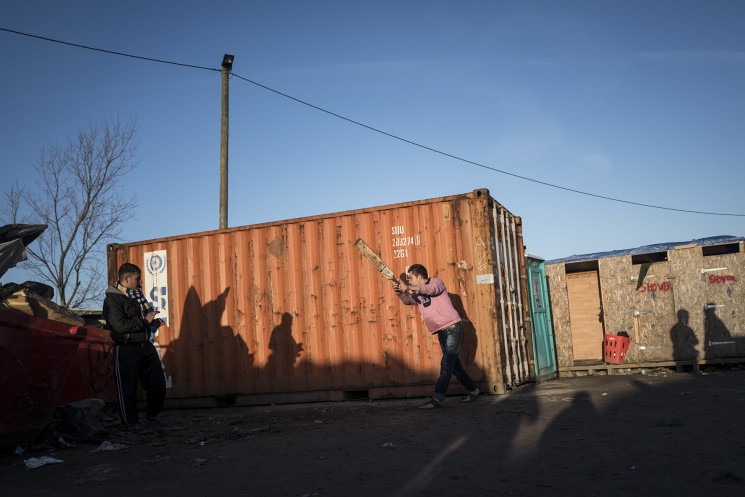
Cricket in Afghan Square, January 2016. Although still bitterly cold, this was the first full day of sunshine after several weeks of rain, during what was for many refugees their first experience of a northern European winter. Under these conditions, once clothes become wet, they are almost impossible to dry out again – so many refugees made full use of this momentary shift in the weather to get out and play. The shipping container in the background houses a small fire engine, built and funded by volunteers from the United Kingdom and operated by a small crew of trained refugees. © Rob Pinney
Rob Pinney is a documentary photographer and researcher with a particular interest in war, post-conflict, displacement and migration issues. His project in Calais is ongoing, a portion of which is now available as a book, The Jungle, available at Call Me By My Name. To see the full series, visit his website. His Twitter handle is @robpinney and his Instagram account is @rob.pinney.





















